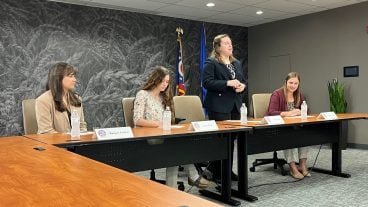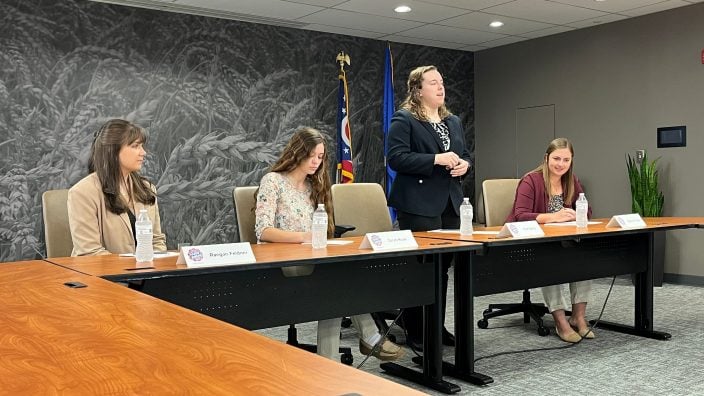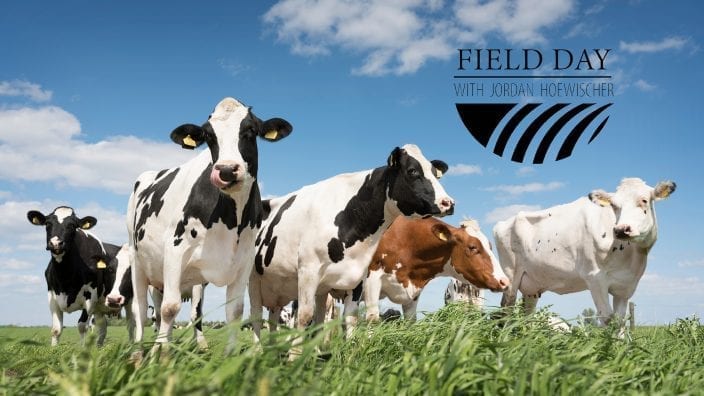Applications for Ohio Farm Bureau Health Plans now available
Members have three ways to apply: contacting a certified agent, calling 833-468-4280 or visiting ohiofarmbureauhealthplans.org.
Read MoreOhio Farm Bureau Director of Water Quality Research Jordan Hoewischer hosts Dr. Leah Dorman for a discussion about her role in the animal health world as a veterinarian and other topics including hormones, antibiotic use and more. Dorman is director of food integrity & consumer engagement at Phibro Animal Health Corporation. Previously, she was on the staff of Ohio Farm Bureau as senior director for animal and food policy.
Field Day with Jordan Hoewischer is an ongoing series of conversations with experts and leaders who are helping to shape and secure the future of Ohio’s ag industry for generations to come.
Below are excerpts from the interview, and here is the transcript. Listen to the complete episode below and past episodes via Soundcloud, or subscribe to the podcast on iTunes and Google Play.
Jordan Hoewischer: So antibiotics obviously have taken a life of their own over the last 10 or 15 years. You have resistance stories. You have overuse stories or you have just maybe misinformation about what’s going on. I think it’s something it’s always close to my heart in terms of animal care and stuff. I grew up on a pig farm. And so those two topics are always the ones I probably get into the most arguments besides maybe GMOs when I’m talking to my friends that are you know farm kids. Give me a lay of the land on the current status of antibiotic use.
Dr. Leah Dorman: You know to me the whole goal is just have a nice conversation because quite frankly the people asking probably have never met a farmer, never met somebody who’s involved on the production side of food: meat milk and eggs mainly. And so what a wonderful opportunity. What a wonderful opportunity to just answer the question simply, openly, honestly that that they have. So that’s going to be my my pointer for you. Don’t have an argument. Don’t get defensive and I know it’s hard. I do. You know there’s time.
Jordan Hoewischer: That’s just general like advice for my whole life. There’s not just a specific conversation just don’t get defensive. Don’t be so sensitive.
Dr. Leah Dorman: And I’ll tell you before I get to the antibiotics question you know I fell in that same role and honestly, Farm Bureau really helped train me. I work really closely and I did even here at Farm Bureau with Center for Food Integrity because they really looked at what builds trust especially with the consumer.
What builds trust? And it’s not facts and science. It’s not skills and ability. It’s about shared values. So what values you know if they’re saying Oh my gosh I can’t believe that you feed all these livestock. You just pour these antibiotics to them. You know what. What’s their fear? What’s their fear What is their value? And there’s a good chance they probably value food safety that they want to make sure that what they’re feeding their family is safe. That it’s nutritional. It could mean that maybe they’re concerned about animal care. You know do you have that many sick animals you know kind of attitude and I understand they don’t they don’t know and they’ve certainly heard lots of negative stuff about agriculture out there. So I always take every conversation as an opportunity to make a really positive impression for agriculture in general.
Jordan Hoewischer: That’s great because in the end the goal is the same for both sides right. They just want to consume. They want to produce and consume you know healthy, safe food essentially. So it’s just a matter of meeting and that to that point that gets that same look.
Dr. Leah Dorman: It is they want to be comfortable. They want to know that it’s OK to eat what they’re eating. And so that’s where we can just give them ability we can give them a little more information you know but lead with those values Lead with hey you know I get it. You know you’re concerned about food safety. Gosh, we are too.
As a matter of fact that’s why we you know whatever the sentence is and in the case of antibiotics you know there are several things in place to be sure that even when animals do need to be treated with antibiotics. There are several things in place to make sure that that food is still safe for you to feed feed your family.
Jordan Hoewischer: I just don’t know if people understand what the current situation is with animal production.
Dr. Leah Dorman: I think that’s true. And I think science is scary for a lot of people which is why we shouldn’t answer their questions with science. Believe me that’s like you know pull the knife out of my heart OK. Because I like science. I’m sort of a nerd. So that’s hard not to answer with with science but we can’t. We have to lead with those values. Now once we’ve made the connection with the consumer at that values level…where can we agree. Where can we agree. We can agree on food safety. We can probably agree on animal care. We can probably agree on we want to be good to the environment, but focus on where you can agree and then lots of times you can sort of follow that up with the science, but we can’t lead with it because if they don’t trust us, they don’t trust our science.
Jordan Hoewischer: We’ll wrap up with what’s the future of the animal medical world or the medicinal world. What is the future, do you think, of how we are administering antibiotics and other medications for us for our livestock?
Dr. Leah Dorman: I think we’re in a mode of continuous improvement. You know we’re always trying to do a better job for our animals in lots of different ways and all the ways I talked about whether it’s housing or whether it’s nutrition we’re getting so much better at as well. Even using some of these nutritional specialty products that help us reduce the need for other medications like antibiotics. Vaccinations we’re getting better at those. You know all of those things I think are really really important. I don’t foresee a world without antibiotics. And I think that’s really important. Antibiotics are not bad. We want to use them responsibly. That is extraordinarily important that we’re using them when we need them in the right circumstances. And and I just think that is really, really key because we want them to work both for humans and animals when we need them most. So we do need to continue to get better at diagnosis and and using these medications appropriately. So I think what I foresee in the future are several things I think we’re going to continue to find more as I called nutritional specialty products. I think we’re gonna see more things like that that do have, that do work. They efficacy.
You know some people like to call it “fru fru dust” and and no there are actually some things that work out there. I think we’re going to see more in vaccines and vaccine technology. I think we’re going to continue to see more on gene editing. I think that’s a fascinating opportunity. And it’s fascinating because we now are becoming to recognize the potential in disease prevention.
I think we’re gonna see some additional tools in our toolbox, but I think it’s extraordinarily important that we maintain the use of antibiotics for prevention, control and treatment.


Members have three ways to apply: contacting a certified agent, calling 833-468-4280 or visiting ohiofarmbureauhealthplans.org.
Read More

Collegiate Farm Bureau serves as a connection to current industry professionals and equips the next generation with the essential tools and resources needed to excel in their careers.
Read More

Ohio Farm Bureau members met one-on-one with state legislators and staff to discuss policy priorities impacting Ohio’s farms and rural communities.
Read More

Legacy nutrient deductions enable new farmland owners to claim deductions on the nutrients within the soil on which healthy crops depend.
Read More

Farmers, agribusinesses and community members are encouraged to nominate their local fire departments for Nationwide’s Nominate Your Fire Department Contest through April 30.
Read More

Introduced by Sen. Paula Hicks-Hudson, SB 120 would establish the Urban Farmer Youth Initiative Pilot Program.
Read More

Gases, vapors, and fumes can all create risk. How can we measure and protect ourselves from them?
Read More

The Ohio Farm Bureau’s Young Agricultural Professionals State Committee has named its 2026 leadership and the individuals who will be serving on the state committee for 2026-2028.
Read More

The Ohio Farm Bureau Foundation has multiple scholarships available to Ohio students from rural, suburban and urban communities who are pursuing degrees with a connection to the agricultural industry.
Read More

With 100% bonus depreciation now permanent, farmers can deduct the full cost of a new agricultural building in the year it’s placed in service.
Read More